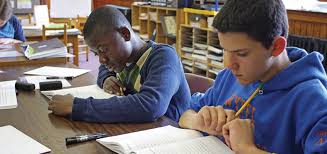Effects of School and Home Environment on Students’ Learning at Secondary Level
Keywords:
climate, teacher–student relationships, teaching quality, peer influence, learning resources, school infrastructureAbstract
This study investigates the effects of both school and home environments on students’ learning outcomes at the secondary level. Recognizing that academic achievement is shaped by a combination of institutional and domestic factors, the research explores the influence of climate, teacher–student relationships, teaching quality, peer interactions, and the availability of learning resources and infrastructure in schools. Similarly, it examines the role of parental involvement, socio-economic status, home study habits, family support, and access to digital learning tools within the home setting. A mixed-methods approach was employed, utilizing surveys, classroom observations, and semi-structured interviews with students, teachers, and parents from diverse socio-economic backgrounds. Quantitative data were analyzed using descriptive and inferential statistics, while qualitative data were thematically coded to identify recurring patterns. Findings reveal that a positive school climate, supportive teacher–student relationships, adequate learning facilities, and constructive peer influence significantly enhance student motivation and academic performance. Likewise, parental engagement, stable socio-economic conditions, consistent study routines, and reliable digital access at home were found to strongly correlate with improved learning outcomes. The study underscores the need for integrated interventions where both schools and families collaboratively foster environments conducive to holistic student development. Recommendations include targeted teacher training, improved infrastructure, parental education programs, and policies to bridge the digital divide.
Downloads
References
Aslam, M., & Kingdon, G. (2012). Parental education and child health—Understanding the pathways of impact in Pakistan. World Development, 40(10), 2014–2032. https://doi.org/10.1016/j.worlddev.2012.05.007
Bandura, A. (1977). Social learning theory. Prentice Hall.
Bronfenbrenner, U. (1979). The ecology of human development: Experiments by nature and design. Harvard University Press.
Cohen, J., McCabe, L., Michelli, N. M., & Pickeral, T. (2009). School climate: Research, policy, practice, and teacher education. Teachers College Record, 111(1), 180–213.
Cooper, H., Robinson, J. C., & Patall, E. A. (2006). Does homework improve academic achievement? A synthesis of research, 1987–2003. Review of Educational Research, 76(1), 1–62. https://doi.org/10.3102/00346543076001001
Day, C., Sammons, P., Stobart, G., Kington, A., & Gu, Q. (2007). Teachers matter: Connecting lives, work, and effectiveness. McGraw-Hill Education.
Desforges, C., & Abouchaar, A. (2003). The impact of parental involvement, parental support and family education on pupil achievement and adjustment. Department for Education and Skills.
Earthman, G. I. (2004). Prioritization of 31 criteria for school building adequacy. American Civil Liberties Union Foundation of Maryland.
Fan, W., & Chen, M. (2001). Parental involvement and students’ academic achievement: A meta-analysis. Educational Psychology Review, 13(1), 1–22. https://doi.org/10.1023/A:1009048817385
Hattie, J. (2009). Visible learning: A synthesis of over 800 meta-analyses relating to achievement. Routledge.
Hyde, J. S., Lindberg, S. M., Linn, M. C., Ellis, A. B., & Williams, C. C. (2008). Gender similarities characterize math performance. Science, 321(5888), 494–495. https://doi.org/10.1126/science.1160364
Livingstone, S., Van Couvering, E., & Thumim, N. (2011). Converging traditions of research on media and information literacies: Disciplinary and methodological issues. Handbook of research on media literacy education, 51–72.
Malik, S., & Rizvi, A. (2018). Influence of parental education and home environment on academic performance of students at secondary level. Bulletin of Education and Research, 40(1), 75–88.
Mullis, I. V. S., Martin, M. O., Foy, P., & Hooper, M. (2020). TIMSS 2019 international results in mathematics and science. TIMSS & PIRLS International Study Center.
OECD. (2019). PISA 2018 results (Volume I): What students know and can do. OECD Publishing.
Roorda, D. L., Koomen, H. M., Spilt, J. L., & Oort, F. J. (2011). The influence of affective teacher–student relationships on students’ school engagement and achievement: A meta‐analytic approach. Review of Educational Research, 81(4), 493–529. https://doi.org/10.3102/0034654311421793
Ryan, A. M. (2000). Peer groups as a context for the socialization of adolescents’ motivation, engagement, and achievement in school. Educational Psychologist, 35(2), 101–111. https://doi.org/10.1207/S15326985EP3502_4
Sirin, S. R. (2005). Socioeconomic status and academic achievement: A meta‐analytic review of research. Review of Educational Research, 75(3), 417–453. https://doi.org/10.3102/00346543075003417
Thapa, A., Cohen, J., Guffey, S., & Higgins-D’Alessandro, A. (2013). A review of school climate research. Review of Educational Research, 83(3), 357–385. https://doi.org/10.3102/0034654313483907
UNESCO. (2020). Global education monitoring report 2020: Inclusion and education – All means all. UNESCO Publishing.
Wentzel, K. R. (2017). Peer relationships, motivation, and academic performance at school. In A. J. Elliot, C. S. Dweck, & D. S. Yeager (Eds.), Handbook of competence and motivation: Theory and application (pp. 586–603). Guilford Press.

Downloads
Published
Issue
Section
License
Copyright (c) 2025 Hina Fatima, Dr Naeem Mohsin, Sana Azeem (Author)

This work is licensed under a Creative Commons Attribution-NonCommercial-NoDerivatives 4.0 International License.
Authors retain the copyright of their work. All articles in Scholar Insight Journal are published under the terms of the Creative Commons Attribution 4.0 International License (CC BY 4.0).
This license permits anyone to read, download, copy, distribute, print, search, or link to the full texts of the articles, and to use them for any other lawful purpose, without asking prior permission from the author(s) or the publisher, provided proper attribution is given to the original work.




